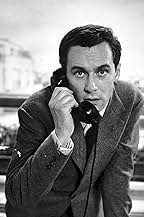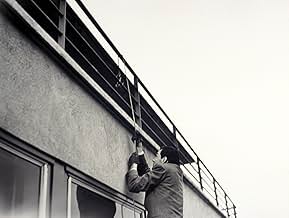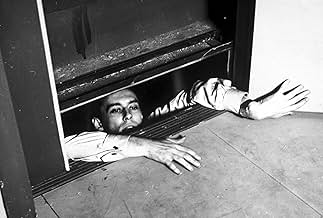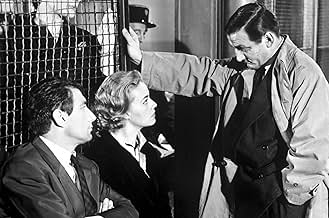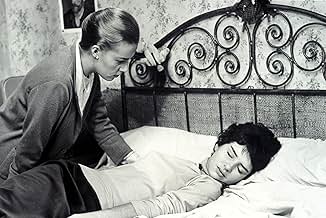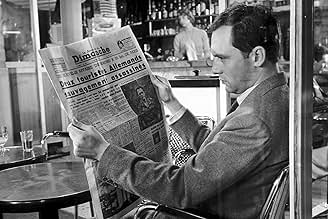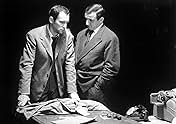IMDb रेटिंग
7.9/10
30 हज़ार
आपकी रेटिंग
एक आत्मविश्वासी बिजनेसमैन अपने बॉस, जो उसकी प्रेमिका का पति है, उसकी हत्या कर देता है, जिससे अनजाने में ही दुर्भाग्यपूर्ण घटनाओं की एक शृंखला बन जाती है.एक आत्मविश्वासी बिजनेसमैन अपने बॉस, जो उसकी प्रेमिका का पति है, उसकी हत्या कर देता है, जिससे अनजाने में ही दुर्भाग्यपूर्ण घटनाओं की एक शृंखला बन जाती है.एक आत्मविश्वासी बिजनेसमैन अपने बॉस, जो उसकी प्रेमिका का पति है, उसकी हत्या कर देता है, जिससे अनजाने में ही दुर्भाग्यपूर्ण घटनाओं की एक शृंखला बन जाती है.
- पुरस्कार
- कुल 1 जीत
फ़ीचर्ड समीक्षाएं
Louis Malle was all of 25 when he made his directorial debut with this 1958 noirish thriller that also serves as a morality play. Using the elevator of the title as a vehicle for his leitmotif, he does an admirable job of capturing the smoky gray atmosphere of Paris in the 1950's and using it to great cinematic effect on a chain-link story of deception and murder. In fact, the whole movie plays like a Francophile version of a James M. Cain novel times two with plot twists coming in quick and sometimes contrived succession. To its credit, the brief 92-minute running time trots by quickly given the multiple story lines.
The labyrinth story focuses first on illicit lovers Florence Carala, the restless wife of a corrupt arms dealer, and Julien Tavernier, a former war hero working for Florence's husband. There is not a wasted moment as they plot her husband's murder, but of course, things go awry with a forgotten piece of evidence and a running car ready to be taken. An amoral young couple, sullen and resentful Louis and free-spirited Veronique, enter the scene tangentially and get caught up in their own deceptions with a boisterous German couple whom they meet through a fender bender. The plot strands meander somewhat and eventually come together in a climax that has all the characters confronting the harsh reality of their past actions. There is a particular poignancy in the photos Florence sees at the end since we have no indication of the depth of emotion between the lovers otherwise.
Malle, along with co-screenwriter Roger Nimier, presents an interesting puzzle full of irony and chance events, but there is a periodic slackness to the suspense, for instance, Florence's endlessly despondent walk though nocturnal Paris. Jazz great Miles Davis contributes a fitting hipster score, though the music is not as big an element as I expected in setting the mood. With her sorrowful eyes and pouting intelligence, Jeanne Moreau makes a vivid impression as Florence and gives her obsessed character the necessary gravitas to make her journey worthy of our interest. Maurice Ronet effectively plays Julien like a coiled spring throughout, and it's intriguing to note how most of his performance takes place in an immobilized elevator. As Louis and Veronique, Georges Poujuloy and the especially pixyish Yori Bertin are the forerunners for the runaway pair in Jean-Luc Godard's "Breathless" replete with youthful angst and mercenary cool.
The print transfer on the 2006 Criterion Collection DVD package is wonderfully pristine. The first disc also contains the original and 2005 re-release trailers, though there is surprisingly no scholarly audio commentary track (the usual bonus for a Criterion release). The second disc, however, makes up for it with a bevy of extras starting with an extensive 1975 early career retrospective interview with Malle, a 2005 interview with an aged but still haunting Moreau, and a joint interview with the two icons and one-time lovers at the 1993 Cannes Film Festival.
Three shorts on the second disc focus on Davis's contribution - the six-minute "The Record Session" shot the night Davis and his musicians recorded the score; a remembrance piece with pianist Rene Utreger, the only surviving member of Davis's ensemble; and the celebratory "Miles Goes Modal: The Breakthrough Score to Elevator to the Gallows" where jazz trumpeter Jon Faddis and music critic Gary Giddins discuss Davis's influence over the generation of musicians to come. There is also a short by Malle set to Charlie Parker's "Crazeology" and an informative 25-page photo essay booklet.
The labyrinth story focuses first on illicit lovers Florence Carala, the restless wife of a corrupt arms dealer, and Julien Tavernier, a former war hero working for Florence's husband. There is not a wasted moment as they plot her husband's murder, but of course, things go awry with a forgotten piece of evidence and a running car ready to be taken. An amoral young couple, sullen and resentful Louis and free-spirited Veronique, enter the scene tangentially and get caught up in their own deceptions with a boisterous German couple whom they meet through a fender bender. The plot strands meander somewhat and eventually come together in a climax that has all the characters confronting the harsh reality of their past actions. There is a particular poignancy in the photos Florence sees at the end since we have no indication of the depth of emotion between the lovers otherwise.
Malle, along with co-screenwriter Roger Nimier, presents an interesting puzzle full of irony and chance events, but there is a periodic slackness to the suspense, for instance, Florence's endlessly despondent walk though nocturnal Paris. Jazz great Miles Davis contributes a fitting hipster score, though the music is not as big an element as I expected in setting the mood. With her sorrowful eyes and pouting intelligence, Jeanne Moreau makes a vivid impression as Florence and gives her obsessed character the necessary gravitas to make her journey worthy of our interest. Maurice Ronet effectively plays Julien like a coiled spring throughout, and it's intriguing to note how most of his performance takes place in an immobilized elevator. As Louis and Veronique, Georges Poujuloy and the especially pixyish Yori Bertin are the forerunners for the runaway pair in Jean-Luc Godard's "Breathless" replete with youthful angst and mercenary cool.
The print transfer on the 2006 Criterion Collection DVD package is wonderfully pristine. The first disc also contains the original and 2005 re-release trailers, though there is surprisingly no scholarly audio commentary track (the usual bonus for a Criterion release). The second disc, however, makes up for it with a bevy of extras starting with an extensive 1975 early career retrospective interview with Malle, a 2005 interview with an aged but still haunting Moreau, and a joint interview with the two icons and one-time lovers at the 1993 Cannes Film Festival.
Three shorts on the second disc focus on Davis's contribution - the six-minute "The Record Session" shot the night Davis and his musicians recorded the score; a remembrance piece with pianist Rene Utreger, the only surviving member of Davis's ensemble; and the celebratory "Miles Goes Modal: The Breakthrough Score to Elevator to the Gallows" where jazz trumpeter Jon Faddis and music critic Gary Giddins discuss Davis's influence over the generation of musicians to come. There is also a short by Malle set to Charlie Parker's "Crazeology" and an informative 25-page photo essay booklet.
A self-assured business man murders his employer, the husband of his mistress, which unintentionally provokes an ill-fated chain of events.
Journalist Barry Farrell wrote, "Moreau had 20 forgettable films behind her... Malle put Moreau under an honest light and wisely let his camera linger. The film was nothing special, but it did accomplish one thing: it proposed a new ideal of cinematic realism, a new way to look at a woman. All the drama in the story was in Moreau's face – the face that had been hidden behind cosmetics and flattering lights in all her earlier films." Farrell is certainly right about the portrayal of Moreau. How can you make a leading lady anything but glamorous? Malle found a way that was quite successful.
As for the film being "nothing special", I think Farrell is wrong. A 1950s French film noir that is well executed? This is something we need more of. Starting with a murder and then spreading out from there, this is a good story of suspense, intrigue and all that. The whole concept of being caught in an elevator is incredible, and probably unprecedented.
Journalist Barry Farrell wrote, "Moreau had 20 forgettable films behind her... Malle put Moreau under an honest light and wisely let his camera linger. The film was nothing special, but it did accomplish one thing: it proposed a new ideal of cinematic realism, a new way to look at a woman. All the drama in the story was in Moreau's face – the face that had been hidden behind cosmetics and flattering lights in all her earlier films." Farrell is certainly right about the portrayal of Moreau. How can you make a leading lady anything but glamorous? Malle found a way that was quite successful.
As for the film being "nothing special", I think Farrell is wrong. A 1950s French film noir that is well executed? This is something we need more of. Starting with a murder and then spreading out from there, this is a good story of suspense, intrigue and all that. The whole concept of being caught in an elevator is incredible, and probably unprecedented.
Greetings again from the darkness. The phrase Film Noir conjures up a certain feel and look and "Gallows" certainly captures what we have come to expect from the genre. However, the great director Louis Malle goes even further with his minimalistic approach to sound, lighting and dialog. Where 1944's "Double Indemnity" wreaks explosive on screen passion, Malle offers up a quiet simmering that draws the viewer into the lives of the main characters.
Jeanne Moreau is the perfect pouty French femme fatale. Her scenes of walking (wandering) the dark, rainy streets of Paris are chilling to watch for film lovers. The weak lighting and lack of make-up allow Moreau's true emotions to guide us. Malle also is tremendous in his filming of the elevator scenes with Maurice Ronet.
The secondary characters of the young lovers played by Yori Bertin (Veronique) and George Poujouly (Louis) are unmistakable in their likeness to Natalie Wood and James Dean. Watching two young kids carelessly destroy their own lives, as well as that of others, is quite the contrast to the well-conceived scheme of Moreau and Ronet.
I have not been able to come up with an apt description of the powerfully improvised jazz score from the legendary Miles Davis. The approach has been mimicked over the years, but never duplicated. It is startling in its ability to slap the viewer in the face! Moreau is of course a screen legend and went on to star in "Jules and Jim", Truffaut's "The Four Hundred Blows" and my personal favorite, "The Bride Wore Black". As great as she was in all of these, I am not sure her essence was ever better captured than her wandering through the Paris streets in "Elevator to the Gallows".
Jeanne Moreau is the perfect pouty French femme fatale. Her scenes of walking (wandering) the dark, rainy streets of Paris are chilling to watch for film lovers. The weak lighting and lack of make-up allow Moreau's true emotions to guide us. Malle also is tremendous in his filming of the elevator scenes with Maurice Ronet.
The secondary characters of the young lovers played by Yori Bertin (Veronique) and George Poujouly (Louis) are unmistakable in their likeness to Natalie Wood and James Dean. Watching two young kids carelessly destroy their own lives, as well as that of others, is quite the contrast to the well-conceived scheme of Moreau and Ronet.
I have not been able to come up with an apt description of the powerfully improvised jazz score from the legendary Miles Davis. The approach has been mimicked over the years, but never duplicated. It is startling in its ability to slap the viewer in the face! Moreau is of course a screen legend and went on to star in "Jules and Jim", Truffaut's "The Four Hundred Blows" and my personal favorite, "The Bride Wore Black". As great as she was in all of these, I am not sure her essence was ever better captured than her wandering through the Paris streets in "Elevator to the Gallows".
The former Captain Julien Tavernier (Maurice Ronet) works in the company of the powerful arms dealer Simon Carala (Jean Wall) and is the lover of his wife Florence Carala (Jeanne Moreau). Julien and Florence plot a scheme to kill Simon simulating a suicide. Julien stays after-hours in the company with the telephone operator and the doorman and comes to his office. He climbs to Simon's office using a rope outside the window and kills the executive. He runs to his office to attend a phone call and forgets the rope, and leaves the building with the two employees to have an alibi. When he is ready to drive his car, he sees the rope hanging outside the building and he returns to withdraw the rope, leaving his overcoat and revolver in the car. When he enters in the lift, the doorman shutdown the building and Julien is trapped inside the elevator.
Meanwhile the smalltime thief Louis (Georges Poujouly) steals Julien's car and drives to a motel with his girlfriend Véronique (Yori Bertin) and lodge using the name of Julien. They drink with the German tourists Horst Bencker (Iván Petrovich) and his wife Frieda Bencker (Elga Andersen) and early in the morning, Louis tries to steal his Mercedes Benz. When he is surprised by Horst, Louis shots and kills the couple. Julien Tavernier becomes the prime suspect of the murder and when he leaves the lift, he does not have alibi for the murder of Simon Carala and the German tourists.
"Ascenseur pour l'Échafaud" is the first feature of Louis Malle, who is also one of the writers. The unpredictable and original story is fantastic, the screenplay has many plot points until the very last scene and the performances are top-notch.
Julien Tavernier is a methodic military with cold blood that gets caught between the rock and a hard place due to a mistake and lots of bad luck. The soundtrack with the music of Miles Davis gives a touch of class to this little masterpiece. The result is one of the best thrillers entwined with comedy of errors that I have ever seen. My vote is nine.
Title (Brazil): "Ascensor Para o Cadafalso" ("Elevator to the Gallows")
Meanwhile the smalltime thief Louis (Georges Poujouly) steals Julien's car and drives to a motel with his girlfriend Véronique (Yori Bertin) and lodge using the name of Julien. They drink with the German tourists Horst Bencker (Iván Petrovich) and his wife Frieda Bencker (Elga Andersen) and early in the morning, Louis tries to steal his Mercedes Benz. When he is surprised by Horst, Louis shots and kills the couple. Julien Tavernier becomes the prime suspect of the murder and when he leaves the lift, he does not have alibi for the murder of Simon Carala and the German tourists.
"Ascenseur pour l'Échafaud" is the first feature of Louis Malle, who is also one of the writers. The unpredictable and original story is fantastic, the screenplay has many plot points until the very last scene and the performances are top-notch.
Julien Tavernier is a methodic military with cold blood that gets caught between the rock and a hard place due to a mistake and lots of bad luck. The soundtrack with the music of Miles Davis gives a touch of class to this little masterpiece. The result is one of the best thrillers entwined with comedy of errors that I have ever seen. My vote is nine.
Title (Brazil): "Ascensor Para o Cadafalso" ("Elevator to the Gallows")
Elevator to the Gallows is a great film and even better, has a short running time! The acting is great in every instance, the plot is original, and the direction is probably among the best I've ever seen. I loved how the plot had a lot of twists but there weren't so many that you were confused as to what was going on. Although I won't reveal the ending, I thought it was great and made me smile. However, you have to like this type of movie to see it, as it is kind of complicated and there isn't a ton of action. This film shows how the perfect murder can be only planned so well; you can never plan what could happen. If you don't get bored too easily, stick with this gem and I'm sure you'll love it.
क्या आपको पता है
- ट्रिवियाMiles Davis recorded the music in a single recording session while he watched a screening. He composed it while watching a rough cut and then invited a quartet of French and US musicians in a for few hours (from 11pm to 5am one night), improvising each number and allegedly sipping champagne with Jeanne Moreau and Louis Malle.
- गूफ़When Florence arrives at the motel, the photos are just being developed - with the lights on! Exposing the prints to light before fixation would make them turn black. By the way, it's not recommended to put your hands into developer.
- भाव
Julien Tavernier: Don't sneer at war. It's your bread and butter. Indochina netted you how much? And now Algeria. Have some respect for war. It's your family heirloom.
- साउंडट्रैकAscenseur Pour L'Échafaud (Générique)
Composed by Miles Davis
Performed by Miles Davis (Trumpet), Barney Wilen (Tenor Saxophone), Emilhenco (as René Urtreger) (Piano), Pierre Michelot (Bass) and Kenny Clarke (Drums)
टॉप पसंद
रेटिंग देने के लिए साइन-इन करें और वैयक्तिकृत सुझावों के लिए वॉचलिस्ट करें
- How long is Elevator to the Gallows?Alexa द्वारा संचालित
विवरण
- रिलीज़ की तारीख़
- कंट्री ऑफ़ ओरिजिन
- आधिकारिक साइटें
- भाषाएं
- इस रूप में भी जाना जाता है
- Elevator to the Gallows
- फ़िल्माने की जगहें
- 26 Rue de Courcelles, Paris 8, पेरिस, फ़्रांस(Tavernier climbing on the upper terrace)
- उत्पादन कंपनी
- IMDbPro पर और कंपनी क्रेडिट देखें
बॉक्स ऑफ़िस
- US और कनाडा में सकल
- $3,74,671
- US और कनाडा में पहले सप्ताह में कुल कमाई
- $7,354
- 26 जून 2005
- दुनिया भर में सकल
- $4,31,784
- चलने की अवधि1 घंटा 31 मिनट
- रंग
- पक्ष अनुपात
- 1.66 : 1
इस पेज में योगदान दें
किसी बदलाव का सुझाव दें या अनुपलब्ध कॉन्टेंट जोड़ें

टॉप गैप
By what name was Ascenseur pour l'échafaud (1958) officially released in India in English?
जवाब

